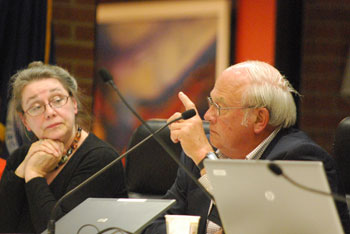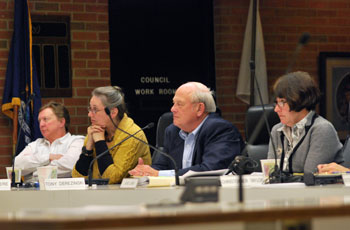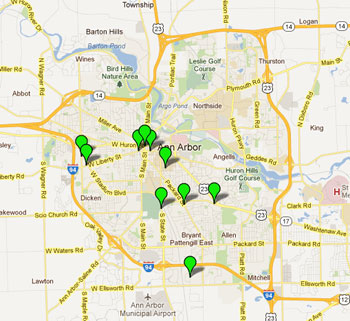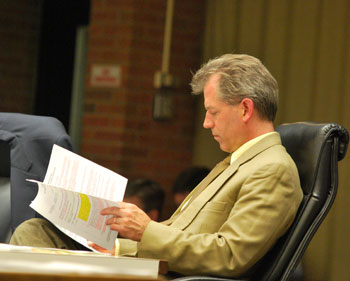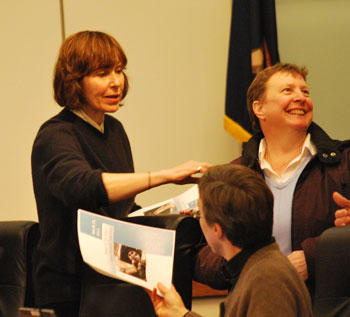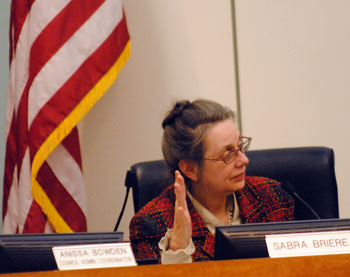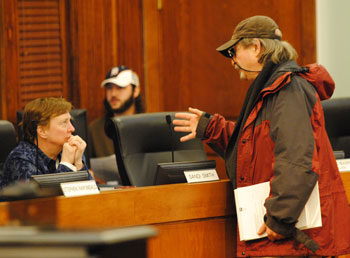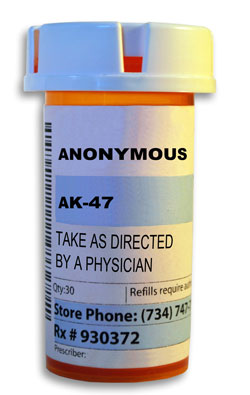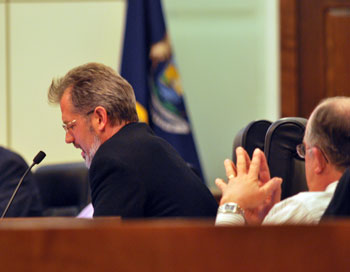On Wednesday, Nov. 30, 2011, the medical marijuana licensing board in Ann Arbor, Mich., took something like a straw poll on a recommendation that the city award its first dispensary license – to MedMarx at Arborside Compassion, located at 1818 Packard St.
The form of the poll strongly resembled a vote by the board to recommend the dispensary for a license, leading some observers to conclude that the recommendation had been made. But a subsequent email from board member Sabra Briere indicated the board had voted that it “would have recommended MedMarx for a license, if they were making recommendations at that meeting.” Once the board takes a formal vote on the recommendations that it wants to make to the city council, the city council will still need to vote as well, in order for the license to be awarded.
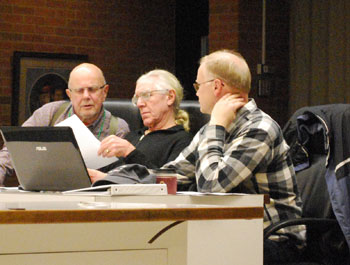
Ann Arbor medical marijuana licensing board members (left to right): John Rosevear, Gene Ragland and James Kenyon. They're perusing a letter from MedMarx at Arborside Compassion to the city of Ann Arbor, stating the dispensary's position on its compliance with the Michigan Medical Marijuana Act. (Photos by the writer.)
Ann Arbor’s medical marijuana licensing board was established as part of an ordinance regulating licenses for medical marijuana dispensaries, enacted by the city council on June 20, 2011.
The licensing ordinance was enacted at the same time as a zoning ordinance, which regulates where such businesses can be located in the city. The two pieces of legislation were enacted after more than a year of consideration and deliberations by members of the city council.
On Wednesday, the board considered seven out of a total of 10 license applications that had been submitted to the city. The remaining three are for businesses located in areas not zoned for medical marijuana businesses. However, at least two of those intend to ask for a review of the city’s decision to deny a zoning compliance permit (required as part of the license application) by the city’s zoning board of appeals (ZBA).
Besides the one application on which the board voted, four of the other six applications were determined to have met the requirement demonstrating that they were in operation before the council enacted a moratorium. That moratorium was established on Aug. 5, 2010 and prohibited establishment of any additional medical marijuana businesses in the city.
The board’s work on Nov. 30 came as attitudes on medical marijuana nationally, at the state level and locally are in flux. Nov. 30 was the same day that governors from the states of Washington and Rhode Island signed a petition appealing to the federal Drug Enforcement Administration to reclassify marijuana has a drug having medical uses.
And the licensing board meeting came at the conclusion of a series of day-long seminars in different Michigan cities given on Nov. 16, 17, 29, and 30 by staff of Michigan State Attorney General Bill Schuette on how to enforce the Michigan Medical Marijuana Act. The seminars included the case law that has evolved – including the McQueen case, in which a Michigan court of appeals found that at least one business model for operating a dispensary is not consistent with the MMMA.
According to a report from The Saginaw News, Schuette’s “Clearing the Air” seminars were closed to the press. The materials provided at the seminars include a range of legal tools the attorney general believes can be used to prevent medical marijuana dispensaries from doing business. One of those tools is to apply laws on public nuisances to such businesses.
The city of Ann Arbor has sent cease-and-desist letters to medical marijuana dispensaries in the city threatening to take action against them as public nuisances. Cease-and-desist letters were received by a business as recently as Nov. 8. [.pdf of letter to zoning-non-conformant business][.pdf of letter to zoning-conformant business]
During public commentary at the licensing board meeting, local attorney Dennis Hayes noted a disconnect between (1) letters sent by Ann Arbor city attorney Stephen Postema to businesses threatening to shut them down, and (2) a licensing board that is implementing the new city ordinance on allocating licenses to medical marijuana businesses. Hayes described the situation as the “right hand doing something very different from the left hand.” Hayes encouraged the licensing board to move its “right foot to drag the left foot along.”
The board’s next scheduled meeting is Dec. 14 at 4 p.m. [Full Story]




